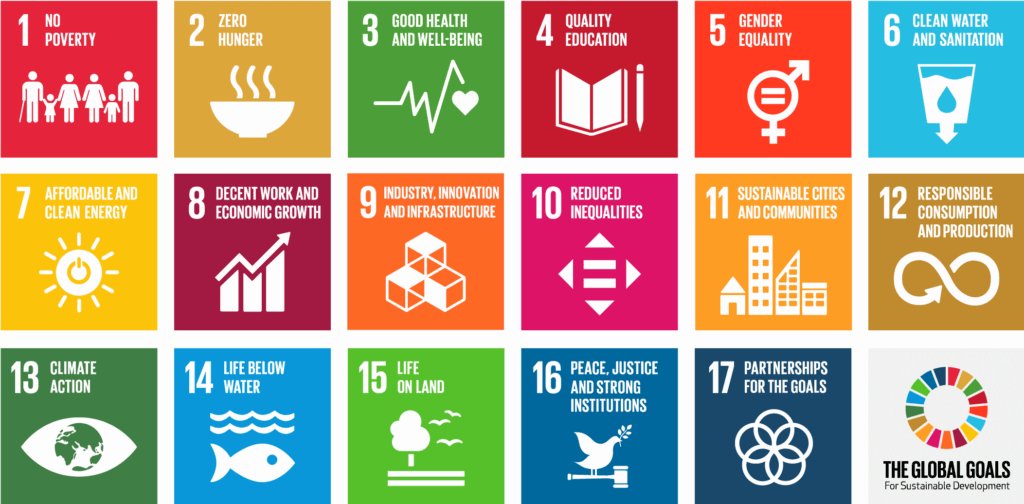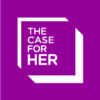The Case for Her supports the Global Goals and organizations such as Menssäkrad (Period Protected) for their work in creating innovative solutions that bring the world closer to achieving all 17 goals.
The following is a translated version of the original Swedish post from the Menssäkrad Blog on May 26, 2021.
Our work and that of others to normalize menstruation lead to positive effects for all 17 global goals. This is because all the goals are connected! Some goals can be linked more directly than others, but all goals are relevant.

Goal 1 – No poverty.
Menstruation affects and is affected by all aspects of society. Among other issues, there is a financial cost to use menstrual products. Menstrual products can be expensive, and in some countries, such as Sweden, they are taxed at the same level as luxury goods like furniture and makeup. People who struggle financially may find it challenging to buy the menstrual products they need, and some have even been forced into prostitution to afford menstrual products.
Research has shown that those who receive menstrual products for free through various projects can save money for food, clothing, or even higher education. Offering menstrual products free of charge and prioritizing the needs of menstruating people can reduce the vulnerability of people living in poverty.
Goal 3 – Good health and well-being.
Some products or materials used to collect menstrual blood are not hygienic. They can cause deadly infections in a worst-case scenario, making access to clean and healthy menstrual products a health issue. Cloth (i.e., cloth rags) is often referred to as unhygienic and unsuitable, but it is important to remember the material itself is not unhygienic. The risk of infection begins when the fabric cannot be washed and dried properly. Knowledge and the opportunity to choose menstrual materials and good washing options are therefore essential for good health.
Shame and social exclusion of menstruating people can also lead to mental illness. Normalizing menstruation and getting rid of the shame around it is therefore very important. It also increases both the understanding of and the security of the individual.
Diseases related to menstruation and the menstrual cycle are also important to discuss. For example, 10-20% of the menstruating population lives with endometriosis, which can lead to severe complications and obstacles in life. PCOS, PMDS, and ovulation pain are some other examples. More research and knowledge about these conditions will lead to increased health for these groups.
Goal 4 – Quality education.
Menstruating people all over the world testify that they sometimes avoid school because of menstruation. It may be that they lack sufficient menstrual materials to keep them from getting blood on their clothes and thus become teased and excluded, but it may also be about physical ailments such as menstrual cramps or PMS. Some drop out of school altogether due to problems related to menstruation and the menstrual cycle.
According to the UN, a proper education means effective education of high-quality for everyone, where the school environment takes gender aspects into account. As it stands now, most schools worldwide do not take menstruation into account as a gender equality aspect, and menstrual materials in the vast majority of schools are not offered free of charge in the toilets.
In addition, sex education is lacking on several points, including menstruation and the menstrual cycle. This lack of education leads to insufficient knowledge about rights, opportunities, and, e.g., about when to seek medical treatment for symptoms related to one’s menstrual cycle.
Objective 5 – Gender equality.
This goal includes work to stop violence in close relationships and discrimination, increase access to reproductive health care and rights, and support equal access to financial resources and positions of power. By normalizing menstruation, increasing knowledge about it, minimizing the shame around it, and prioritizing the rights of menstruating people, we can reach a new level of equality—equal schooling, equal workplaces, equal policy, and economy.
Goal 6 – Clean water and sanitation.
Sub-goal 6.2 says we must pay “special attention to the needs of women and girls and those in vulnerable situations.” This statement is paraphrasing the priority of the needs of menstruating people. Allowing everyone access to clean toilet facilities with a door and lock can make everyday life safe for many people—both to avoid discrimination and exclusion due to the shame of menstruation and minimize the risk of infections.
Goal 10 – Reduced inequalities.
No one should be excluded from development, and everyone should have equal rights, opportunities, and obligations regardless of their sex, gender, ethnicity, religion, functional variation, age, etc. Menstruating people can also be people with disabilities or other norm-breaking characteristics/attributes and can face oppression on several levels.
Ensuring that people with functional variations receive sex education, including menstrual health and rights, is an essential aspect of reducing inequality. Ensuring that we consider the gender identity and the needs of people who experience oppression due to their skin color and ethnicity when working with menstruation is fundamental.
About Menssäkrad
Menssäkrad translates to ‘Period Protected’ and is owned by the social company World Period Group AB. Menssäkrad works for inclusive schools and workplaces through sales of menstruation-safe products, long-term subscriptions to menstrual protection, and tailored consulting services.
- The Case for Her Teamhttps://thecaseforher.com/blog/author/tcfh-team/
- The Case for Her Teamhttps://thecaseforher.com/blog/author/tcfh-team/
- The Case for Her Teamhttps://thecaseforher.com/blog/author/tcfh-team/
- The Case for Her Teamhttps://thecaseforher.com/blog/author/tcfh-team/


